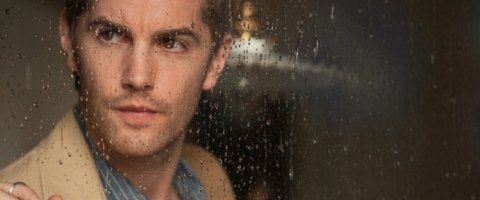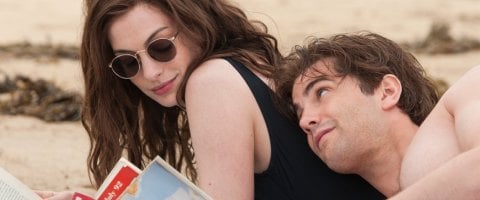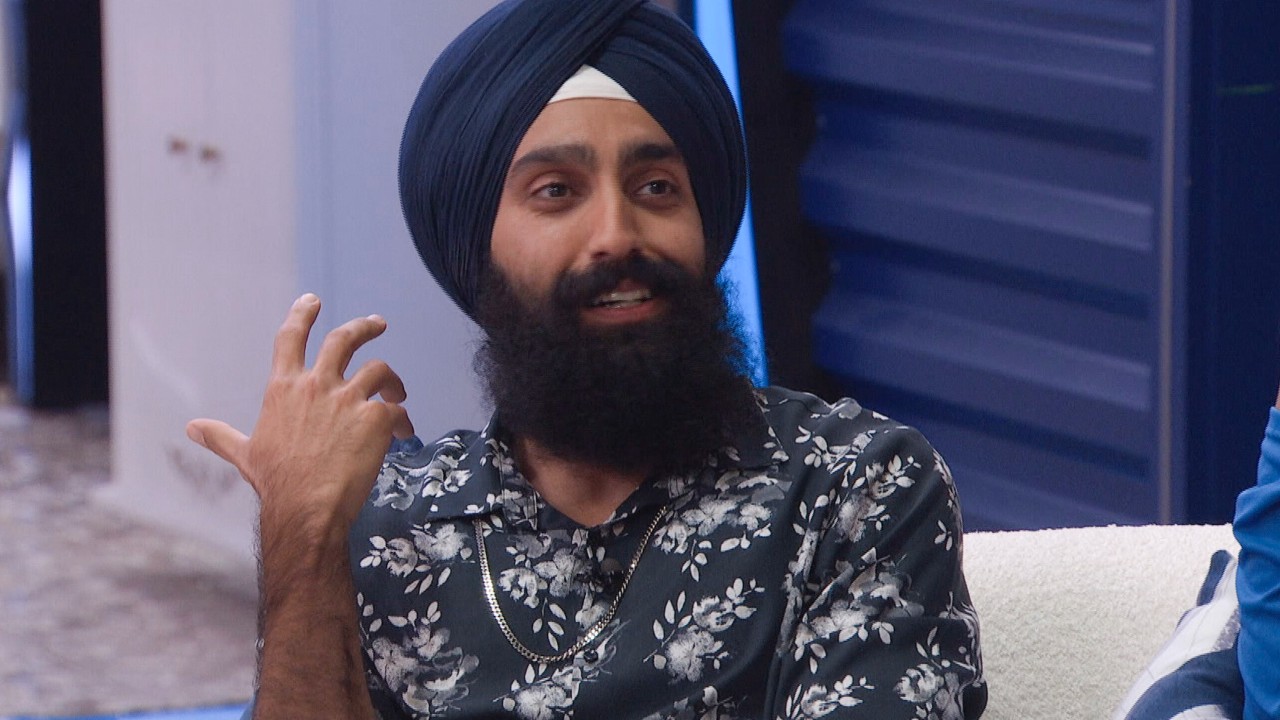Interview: Jim Sturgess Doesn't Mind Aging Up For One Day

As Jim Sturgess sees it, there wasn't really a downside to suddenly being a heartthrob, thanks to roles in Across the Universe and then the megahit 21 that turned the dark-eyed Brit into a very big deal. But instead of cashing in and going after whatever next big role Hollywood could throw at him, Sturgess used his newfound fame to go back to Britain and make two small movies, films that eventually led him to a role in Peter Weir's epic The Way Back and now to One Day, the romance with Anne Hathaway that opens this Friday.
Sturgess and Hathaway play Dexter and Emma, two people who almost have an one-night stand on the last night of college, but instead strike up a friendship that carries throughout the next 20 years. True to the tittle, we meet up with Dexter and Emma on one day every year-- July 15, St. Swithin's Day-- to see where their lives have taken them, whether it's Emma's crappy job at a bad Mexican restaurant or Dexter's accidental career as a TV host. This being a movie starring two very attractive young actors, Dex and Emma eventually do fall in love, but it's the journey that gets them there-- and what it takes them to realize what they want-- that makes One Day both a deeply romantic movie and a special one.
I talked to Sturgess last week about how he managed his career post-21, how shooting One Day was a kind of vacation after the brutal conditions of The Way Back, and how it wasn't that shocking seeing himself with gray hair once Dexter made it into middle age.
After 21 and Across the Universe made you this kind of heartthrob figure in the media, did that give you pause and make you want to back away from those kinds of roles?
What it did is 21 opened up a lot of opportunities, and made it possible to help get a film financed, which is really the exciting part, when you can really get a film off the ground. There were two films I did after that that weren't heartthrob-type movies. I wasn't trying to get away from it, but I did two films that were interesting to me. I did Fifty Dead Men Walking and a British film called Heartless.
Those are both small films too. Were you trying to balance it out and not get thrown into the Hollywood machine?
The films that I really liked and the ones that really blew my mind when I was younger were independent films. They're like great records to me. Rather than a shiny Hollywood movie or whatever. I was excited to get the opportunity to act in an intense sort of film with great filmmakers. If you make some of the smaller films, I think some of the really good filmmakers, interesting directors, look at the smaller [films]-- you don't need that box office hit. So then for Peter Weir, to get the phone call and for him to want me to be in his film, made everything so worthwhile.
Your Daily Blend of Entertainment News
The contrast between The Way Back and this is so significant, since here you're just shooting in London and France. It's like a vacation compared to The Way Back.
That's what I thought. I thought, this will be a nice remedy to this intense experience I just had. But every film comes with its own complications. In this film every day was the 15th of July, so that was nice, you knew you weren't going to have to battle some winter scene. It was in London, it was at home, it was a romance film. But it came with its own complications and difficulties.

Is it the deep emotions in the movie that make those difficulties?
Yeah. Whatever the character is feeling you have to be in that kind of a mood, and it does affect you in some sort of way. I don't go around being in the zone all day, I'm not like that. I started off the film thinking, well, Dexter's a fun-loving crazy guy, but there's a real down side to his behavior. We played a lot more on that, his insecurities and troubles and tragedies he goes through. Plus the hard part about this film, it was like making a new film every time you went into work. With The Way Back there was a consistency. You started to live and breathe what these people were doing. Showing up to work and getting into the spirit of the film was very easy. With this, every time you come into work it's like, "OK, what are you going to throw at me today." OK, now you've got a baby-- deal with that. Then you go home and you pass out, wake up and come into work-- now you're a TV presenter, interview this hip-hop band and dance around. Every day was like making a new genre and a different film.
Was there a particular age for Dexter that you most liked playing?
I really enjoyed playing him older. I liked all the stuff in Paris, and I really enjoyed the stuff with his daughter, when they're together.
Was seeing yourself with gray hair startling?
I've seen myself looking weirder, definitely. But yeah, it was interesting. We sort of did these tests that you can do on a computer, to see what happens to you when you age, run yourself through this software. Looking at family members and how they aged, to mimic what my genes may or may not do.
Do you feel like you looked like you did when you were 22 in the movie?
I did. There's a picture I had of myself when I was about 16, and i had floppy, curtain hair. When I had a shave and they put the wig on, I was like "I looked just like that."
Staff Writer at CinemaBlend

